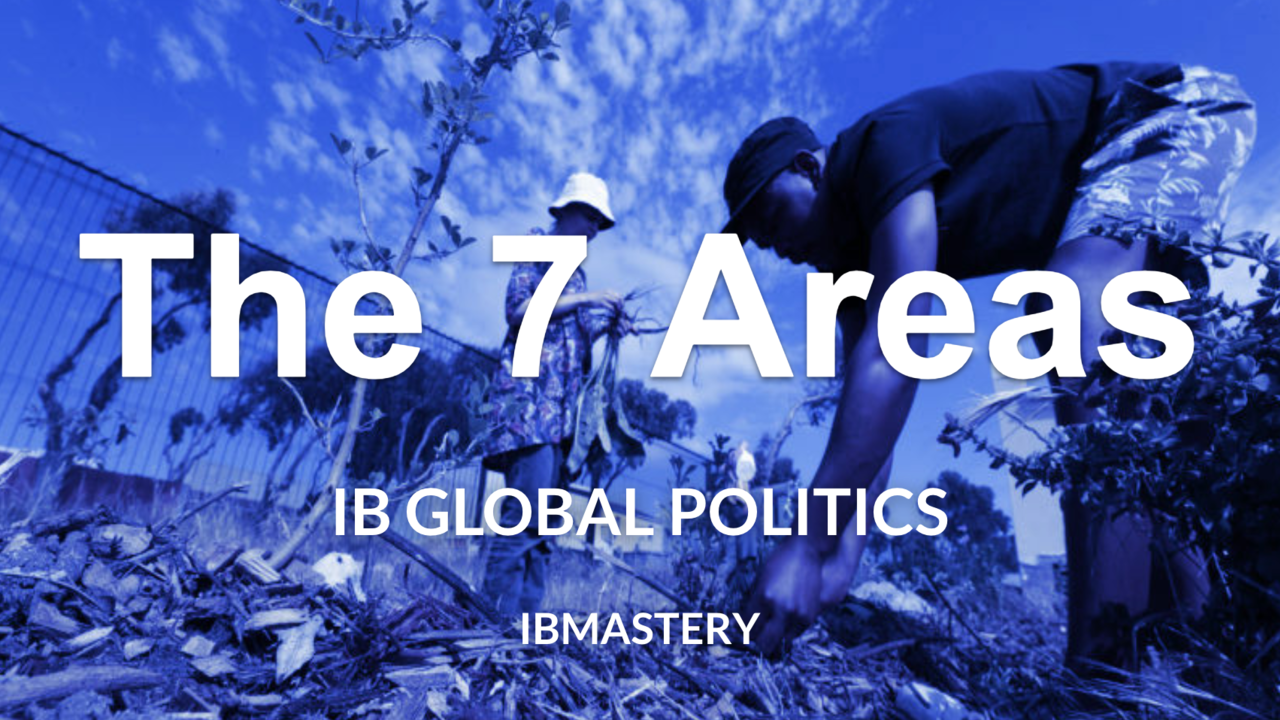The 7 Areas of Global Politics

Global politics is unique in the IB program for how many approaches to analysis it uses. But each of these approaches are equally relevant and useful, even though they are different. In general you'll also ways be making insight loops (linking key words and course terms) to build insights, but you can use a variety of tools to build them.
Use this list of the 7 areas of the course to explore, to really dig into how things work in the world of Global Politics and why. Draw on all 7 areas if you can to build insightful, meaningful explanations and earn marks on your exam questions and in your assignments.
The 7 Areas of IB Global Politics
The following is a list of the ways we make sense of things in Global Politics
Contexts
- Use examples, cases and case studies to explain what's going on.
- Sometimes it's useful to use two contrasting cases. Explain the similarities and then explain some of the differences. Draw on your insights from comparing and contrasting to make sense of what is going on and perhaps note why they seem to have different outcomes.
Stakeholder perspectives
- There are at least two sides to every story. Use quotes and other information to go beyond the obvious ideas and help us understand what's going on. Share how various groups and individuals are see the situation and try to show the justification for peoples' thinking. This might take you toward another idea, such as cultural relativism, sustainability or legitiimacy.
- Try to pull in insights from powerful and less powerful groups and individuals.
- Be careful to not simply guess at how people feel or how they see things. Often how people see things is not what you would expect.
- Quotes are very powerful here.
Theoretical perspectives (Political Theories)
- Realism, Neorealism, Liberalism, Neoliberalism, Social constructivism, Critical theory, Feminism, Marxism, Post-colonialism, Relativism, and Universalism.
Levels of analysis
- You already know that the levels of analysis in Global Politics are: Global, Regional, National, Local, and the Group or Individual level
- Choose one or two of these levels, and explore your question or context details on those levels.
- How you will do this really depends on the question you are answering. However, often it is useful to explain how the realities on one level (i.e. the regional trends) are quite different from the effects on another level (i.e. within a specific community).
Course Concepts
- You can directly link to any of the main concepts in the course. Power, Sovereignty, Legitimacy, and Interdependence are the main concepts.
- These studies include: Justice, Human Rights, Liberty, Equality, Development, Globalisation, Inequality, Sustainability, Peace, Conflict, Violence, and Non-violence, to name a few.
- For example you could use one of the terms above, clarify how it's relevant and then use another key term within that section (i.e. Power --> soft power) to clarify more precisely a single aspect of what is going on and how, using an insight loop.
The Core and Thematic studies
- The core topic is Understanding power and global politics -- i.e. Stakeholders and actors, Systems (structures and dynamics), Legal frameworks, norms and institutions.
- The thematic studies are: 1) Rights and Justice -- i.e. Rights, Justice, Liberty, Equality. 2) Development and Sustainability -- i.e. Development, Sustainability, Poverty, Inequality. And, 3) Peace and Conflict -- i.e. Peace (including positive and negative), Conflict (including latent and overt), Violence (including direct, structural and
cultural), and Non-violence
Global Political Challenges (GPCs)
- Our GPCs are: Borders, Environment, Poverty, Health, Identity, and Security. (For the new version of the course Equality and Technology are now added)
- HL students will be more familiar with these because they are the focus of the Higher Level Extension presentations in HL (this approach is not in the new version of the course). SL students don’t (technically) need to learn them or use them. But HL students can often make an insightful link to a GPC to help them answer a question or better understand a case.
- For example, you might point out that a specific conflict, such as the "Yemeni Civil War (2014–present)" has had significant effects not only on security, but also on the health of children.
And that’s it.

Tim is available for private tutoring, almost every day, to support you succeed in IB. He is a fully IB-trained teacher and marker, with over 20 years of teaching experience. 🚀 Click here to meet with Tim on Zoom and talk through your work. 🚀
Tim helps students with IB Global Politics, Business Management, Economics, History, English IOs, Biology IAs and College Admissions essays.






